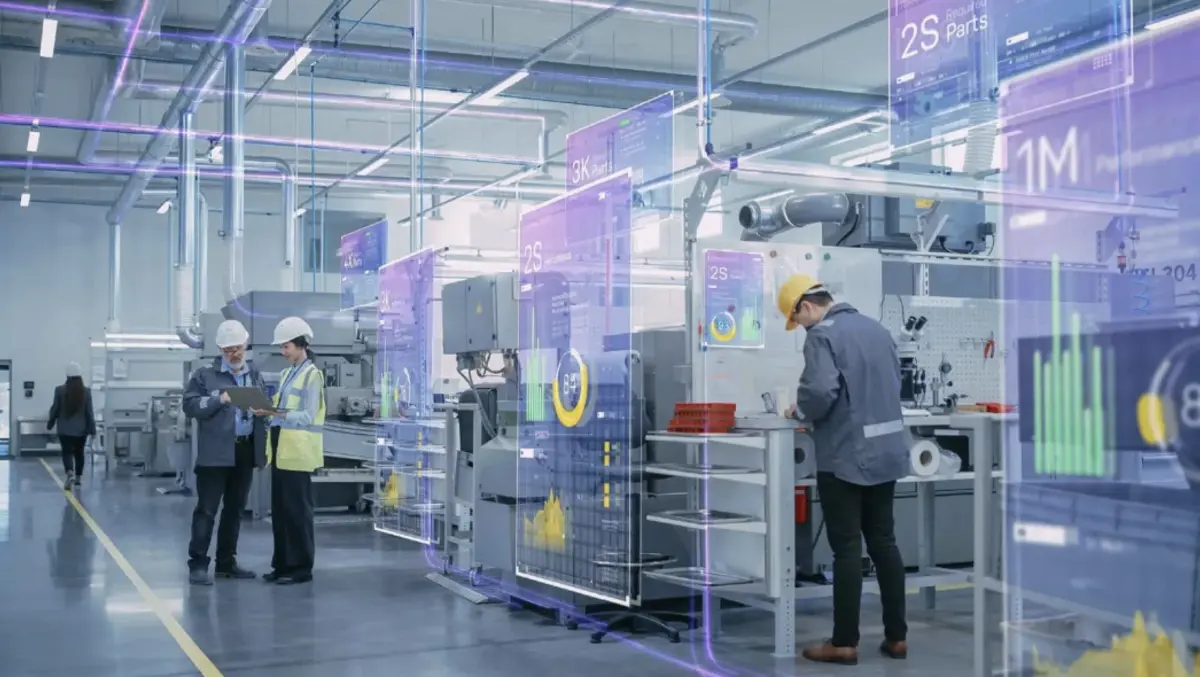
Harnessing AI for the future of manufacturing
As a central pillar of the Fourth Industrial Revolution (Industry 4.0), AI is reshaping how Australian manufacturers operate, innovate, and compete in a rapidly evolving global market. However, this doesn't happen automatically, and Australian manufacturers mustn't get disrupted by others moving ahead of them on the adoption curve.
As overviewed in the AI And Manufacturing: Transforming The Future Of Production white paper, Industry 4.0 refers to the digital transformation of manufacturing processes, with AI playing a pivotal role. Traditional manufacturing systems, which once relied on manual processes and standardised production, are now evolving into smart factories. These facilities leverage AI to create highly automated, flexible, and efficient production environments. The key difference lies in the ability of AI systems to learn and adapt in real-time, enabling manufacturers to respond dynamically to changes in demand, supply chain disruptions, and other operational challenges.
The benefits of AI in manufacturing
For those manufacturers that can maximise their adoption of AI, the benefits are substantial:
Enhanced efficiency and productivity
AI-powered solutions streamline production processes by optimising workflows, reducing downtime, and improving resource allocation. Predictive maintenance is one example where AI algorithms analyse data from sensors embedded in machinery to predict potential failures before they occur. This proactive approach minimises downtime and extends the lifespan of equipment.
Quality control and risk management
AI-driven quality control systems utilise machine vision and deep learning to inspect products in real-time, detecting even the most minor defects more accurately than human inspectors. In addition to improving product quality, AI enhances risk management by analysing market trends, geopolitical events, and supply chain disruptions to develop robust contingency plans.
Customisation and flexibility
One of the most significant challenges in traditional manufacturing is balancing mass production with customisation. AI-driven systems allow manufacturers to personalise products at scale without compromising efficiency. By analysing customer preferences, AI systems can automatically adjust production processes to meet specific requirements, ensuring faster turnaround times and greater customer satisfaction.
Supply chain optimisation
AI enhances supply chain management by improving demand forecasting, inventory management, and logistics planning. AI algorithms analyse historical sales data and market trends to predict future demand more accurately. This reduces overproduction, minimises stockouts, and optimises logistics, ensuring efficient and timely delivery of products.
Overcoming challenges in AI adoption
Despite its transformative potential, AI implementation in manufacturing comes with challenges. High initial investment costs, data security concerns, and the need for workforce reskilling are significant barriers that manufacturers must address.
Investment costs and complexity
Implementing AI requires a substantial upfront investment in technology, infrastructure, and training. Smaller manufacturers may find these costs prohibitive. Additionally, integrating AI systems into existing processes can be complex and time-consuming, requiring careful planning and expertise.
Data quality and governance
For AI systems to function effectively, manufacturers must ensure high-quality data. Poor data quality can result in inaccurate predictions and suboptimal decision-making. Establishing data governance policies and investing in data science capabilities are essential for mitigating this risk.
Workforce re-skilling and job displacement
As AI automates routine tasks, there is a growing concern about job displacement. To address this issue, manufacturers must invest in reskilling programs that equip employees with the skills to collaborate with AI systems. Human-AI collaboration will be crucial for the future workforce, as humans will continue to play a critical role in managing and overseeing AI systems.
Real-world applications of AI in manufacturing
Several manufacturers have embraced AI to modernise their operations and gain a competitive edge. For instance, Australian manufacturer RBM Plastics collaborated with Wild Tech to implement a customised NetSuite solution, streamlining operations, improving supply chain management, and enhancing decision-making processes through real-time insights.
Similarly, MATelec, an Australian-owned manufacturing company, recognised the limitations of its legacy systems and partnered with Wild Tech to modernise its technology platform. The new infrastructure provided MATelec enhanced visibility, scalability, and a foundation for future AI integration.
These case studies highlight the importance of a strategic approach to AI implementation. Manufacturers must define processes, ensure data accuracy, and foster a culture of innovation to unlock the full potential of AI.
The future of AI in manufacturing
Looking ahead, several trends are expected to shape the future of AI in manufacturing:
Smart factories
Smart factories represent the next phase of manufacturing evolution. By integrating AI, IoT, and advanced robotics, these facilities will create fully automated and flexible production environments. Smart factories can adjust production schedules, optimise workflows, and manage supply chains autonomously, ensuring maximum efficiency.
Advances in AI algorithms
Ongoing research in AI will lead to more sophisticated algorithms capable of handling complex tasks. These advancements will further enhance automation, productivity, and decision-making in manufacturing.
Sustainable manufacturing
Sustainability is becoming a priority for both consumers and regulators. AI can promote sustainable manufacturing practices by optimising resource use, reducing waste, and improving energy efficiency. As manufacturers strive to reduce their environmental impact, AI-driven green manufacturing practices will become more prevalent.
Human-AI collaboration
The future of manufacturing will see greater collaboration between humans and AI. While AI will handle routine and dangerous tasks, humans will focus on strategic decision-making and overseeing AI systems. Effectively collaborating with AI will become a key skill for the future workforce.
The integration of AI in manufacturing marks a new era in industrial production. Manufacturers can achieve unprecedented efficiency, productivity, and innovation by leveraging AI technologies. However, the success of AI implementation depends on addressing challenges such as investment costs, data governance, and workforce reskilling.
As AI evolves, manufacturers must adopt a strategic approach to harness its full potential. The manufacturing sector can thrive in an increasingly competitive and dynamic global market by embracing smart factories, sustainable practices, and human-AI collaboration.

